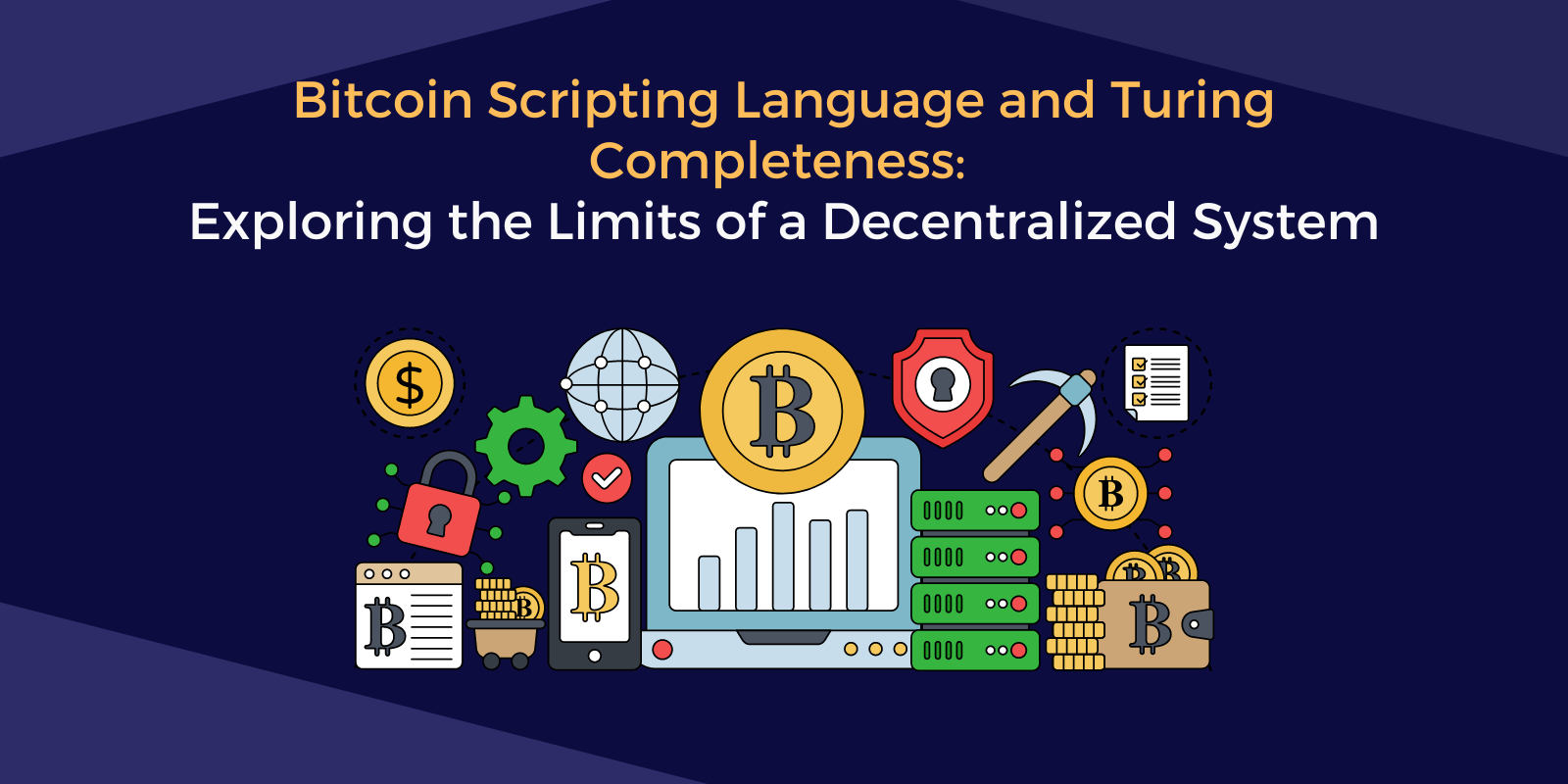Bitcoin Scripting Language and Turing Completeness: Exploring the Limits of a Decentralized System
 Vincent
Vincent
I. What is Turing Completeness?
A. Definition of Turing Completeness
Turing completeness is a concept in computer science that refers to the ability of a computing system to perform any arbitrary computation that can be expressed in a specific formal system. It was introduced by Alan Turing in his landmark paper "On Computable Numbers, with an Application to the Entscheidungsproblem" in 1936.
B. Examples of Turing Complete Systems
Some examples of Turing complete systems include general-purpose programming languages like Python, Java, and C++, as well as more specialized languages like SQL and LaTeX. Another example is the Ethereum blockchain, which is Turing complete and allows developers to create and execute smart contracts on its platform.
II. Bitcoin and its Limitations
A. Introduction to Bitcoin
Bitcoin is a decentralized digital currency that operates on a peer-to-peer network of computers. It was created in 2009 by an anonymous individual or group known as Satoshi Nakamoto, and is based on a technology called blockchain.
B. How Bitcoin Works
The Bitcoin protocol defines a set of rules and procedures that govern how transactions are validated, recorded, and processed on the blockchain. When a user sends Bitcoin to another user, the transaction is broadcast to the network and is verified by a group of nodes called miners. Once the transaction is verified, it is added to a block, which is then added to the blockchain.
C. Bitcoin Scripting Language
Bitcoin also includes a scripting language that allows users to define conditions under which transactions can be spent. The scripting language is designed to be simple and secure, and is used primarily to enforce basic rules like "only spend this transaction if the recipient provides a valid signature".
D. Limitations of Bitcoin Scripting Language
While the Bitcoin scripting language is useful for enforcing basic rules, it has significant limitations when it comes to more complex computations. For example, it cannot perform loops, which are essential for many algorithms. It also has a limited set of operations and does not support recursion or function calls.
III. Arguments for Bitcoin Not Being Turing Complete
A. Limited Functionality of Bitcoin Scripting Language
One argument for Bitcoin not being Turing complete is that its scripting language has limited functionality compared to other programming languages. This means that it cannot perform all of the computations that a Turing complete system can.
B. Inability to Handle Complex Calculations
Another argument is that Bitcoin is not capable of handling complex calculations, which are necessary for many types of applications. While Bitcoin's scripting language is useful for enforcing basic rules, it is not suitable for more complex computations.
C. Difficulty in Implementing General-Purpose Applications
Finally, it is argued that Bitcoin is not well-suited for implementing general-purpose applications. While the Ethereum blockchain allows developers to create and execute smart contracts that can perform complex computations, Bitcoin's scripting language is too limited to support such applications.
IV. Arguments Against Bitcoin Not Being Turing Complete
A. Bitcoin is a Different Type of Computing System
One argument against the idea that Bitcoin is not Turing complete is that it is a different type of computing system than traditional Turing complete systems. Bitcoin was designed primarily to be a secure and reliable system for processing transactions, not a general-purpose computing platform.
B. Turing Completeness is Not Required for Bitcoin
Another argument is that Turing completeness is not required for Bitcoin to function properly. While the ability to perform any arbitrary computation is useful for many types of applications, it is not essential for a digital currency like Bitcoin.
C. Turing Completeness is Not Always a Good Thing
Finally, it is argued that Turing completeness is not always a good thing. While it allows for more flexibility and functionality in a computing system, it also makes the system more complex and potentially less secure. Bitcoin's simplicity and limited functionality may actually be an advantage in terms of security and reliability.
V. Conclusion
In conclusion, the question of whether Bitcoin is Turing complete is not a straightforward one. While Bitcoin's scripting language has significant limitations compared to other programming languages, this does not necessarily mean that Bitcoin is not Turing complete. Arguments can be made for and against the idea that Bitcoin is Turing complete, and the answer may ultimately depend on one's definition of Turing completeness and the specific applications being considered.
Regardless of whether Bitcoin is Turing complete or not, it is clear that it has limitations when it comes to performing complex computations and implementing general-purpose applications. This is not necessarily a weakness, however, as Bitcoin was designed primarily to be a secure and reliable system for processing transactions, not a general-purpose computing platform.
As the use cases for digital currencies continue to evolve, it will be interesting to see how Bitcoin and other blockchain-based systems adapt to meet the needs of developers and users. Whether or not Bitcoin is Turing complete, it is clear that it has played a significant role in the development of the blockchain ecosystem and will likely continue to do so in the years to come.
Sources used include:
"On Computable Numbers, with an Application to the Entscheidungsproblem" by Alan Turing: https://www.cs.virginia.edu/~robins/Turing_Paper_1936.pdf
Bitcoin whitepaper by Satoshi Nakamoto: https://bitcoin.org/bitcoin.pdf
"The Limits of Blockchain Scalability" by Albert Szmigielski: https://www.sciencedirect.com/science/article/pii/S1364815218304316
"Understanding Bitcoin's Scripting Language" by Mark S. Miller: https://medium.com/@marksmiller/understanding-bitcoins-scripting-language-516b6fef88ca
"Bitcoin is not Turing complete" by Tom Zander: https://zander.github.io/posts/Bitcoin%20is%20not%20Turing%20complete/
"Ethereum: A Next-Generation Smart Contract and Decentralized Application Platform" by Vitalik Buterin: https://ethereum.org/en/whitepaper/
"The Impossibility of Distributed Consensus with One Faulty Process" by Leslie Lamport: https://groups.csail.mit.edu/tds/papers/Lynch/jacm85.pdf
Subscribe to my newsletter
Read articles from Vincent directly inside your inbox. Subscribe to the newsletter, and don't miss out.
Written by
